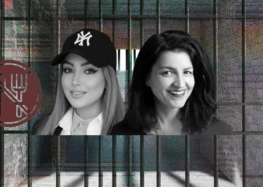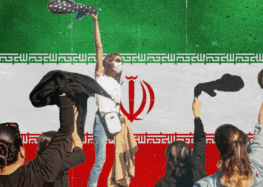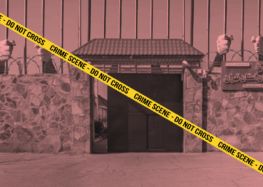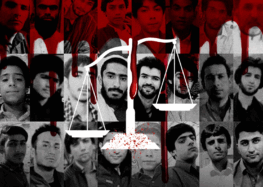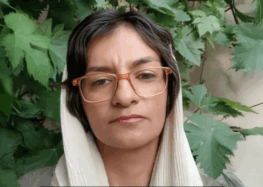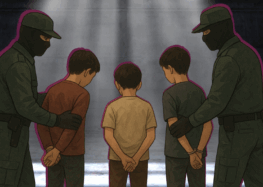Death Sentences Now Where There Would Have Been a Three-Year Sentence Only Five Years Ago, says Lawyer
In an interview with the International Campaign for Human Rights in Iran, Mohammad Sharif, a lawyer who represents political prisoners and a member of the Defenders of Human Rights Center (DHRC), provided information about the case of Kurdish activist, Zeynab Jalalian. Sharif told the Campaign that he does not know the source of recent news about Zeynab Jalalian’s imminent execution, stating that the most reliable sources for confirming such news would be Jalalian herself, her father, her lawyer, or the Judiciary’s Public Affairs Office. None of these sources have provided detailed information about this. He also told the Campaign that he is unable to express any opinions about the case as he is unable to have access to the contents.
“After the death sentence was issued in Zeynab Jalalian’s lower court, her father who is a farmer from Maku and who is not fully fluent in Farsi came to Tehran and asked me to take on Zeynab’s case. I and my colleague Amirsalar Davoodi tried repeatedly to register our powers of attorney with the courts, but we were unsuccessful. Eventually we submitted our powers of attorney and a request to the Tehran Prosecutor’s Office,” said Mohammad Sharif.
“I entered Zeynab’s case at the point where the death sentence had been upheld. We tried to introduce new documents, such as a letter of repentance, to ask for a new trial but we were unsuccessful. Zeynab’s case was in progress in Kermanshah and that’s where her death sentence had been issued and upheld in an appeals court and forwarded to Tehran. We tried to follow up on the case but we were unable to do this. My colleague, Mr. Davoodi then went to the Tehran Prosecutor’s Office with a signed power of attorney and a request to the Tehran Prosecutor to arrange for the power of attorney documents to be taken inside the prison for Zeynab Jalalian to sign and to return it to us to act as her attorneys,” he added.
Referring to his recent activities in this area, Sharif said: “When my colleague went to follow up yesterday, he was told that the request was denied as the ruling has been upheld and therefore a lawyer’s presence in the case is no longer warranted. From my point of view, this reply is not legally justified, because in our legal system even after a ruling is finalized there are steps to the process, even if chances of success may be less than 5%.”
The lawyer to political prisoners said about meeting with Zeynab Jalalian: “As we couldn’t get the power of attorney signed, I was unable to meet with her, but her father has met with her. Her father doesn’t have much information about his daughter’s activities, but he is gravely concerned about losing her.”
Regarding sentences issued by the Iranian Judiciary after the June 2009 election, Sharif said: “Five years ago, some of the cases I represent would have received a three-year prison term, but today they would receive the death sentence. I am not optimistic, but I will do my best to save Zeynab’s life.”
In the end, Sharif said these kinds of executions are harmful for the society. “I have worked on these kinds of cases a lot, I have been a lawyer for many Kurdish girls who collaborated with PKK; I have had close relationships with many of these individuals and their families and know very well that losing them would impact the society, because these people are distinguished and rare to find. What feelings, thoughts, and motivations a girl between the ages of nineteen to twenty-five years might have! When a girl at this age spends the best years of her life either in the mountains or in prison, this is sufficient grounds for my sensitivity towards these cases. Whenever one of these people is lost the society loses. The most significant loss is when two-faced and disingenuous people, who have no humane motives, replace these sincere people. When human beings with this degree of devotion, forgiveness, and sacrifice are lost, the blood of life drains from the veins of the government.”
Background:
Zeynab Jalalian, born in 1982, was arrested in Kermanshah in 2007 and was sentenced to death in October 2009 on charges of waging war against God (moharebeh) through membership in the PKK group. Her execution sentence was upheld by the Islamic Republic of Iran’s Supreme Court. Her close relatives say: “Jalalian has not accepted the charges brought against her. With the death sentence of this political activist, the number of Kurdish activists who have been sentenced to execution during the last two years reaches 13. Their names are as follows: 1 – Ramazan Ahmed; 2- Farhad challesh; 3- Shirko Moarefi; 4- Rostam Arkia; 5- Farzad Kamangar; 6- Ali Heidarian; 7- Farhad Vakili; 8- Hiva botimar; 9- Anvar Hossein Panahi; 10- Arsalan Oliaei; 11- Habiballah Latifi; 12- Fasih Yasamani; 13- Zeinab Jalalian

